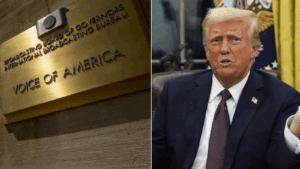AP celebrates victory for press freedom as Judge McFadden critiques government censorship
Court Orders White House to Reinstate Associated Press Journalists' Access

Court Orders White House to Reinstate Associated Press Journalists' Access
Federal ruling acknowledges First Amendment rights amid dispute over Gulf name change
The Associated Press (AP) has been granted access to presidential events once again after a US judge ruled that the Trump administration's restrictions were unconstitutional. District Judge Trevor McFadden stated on Tuesday that blocking AP journalists based on their refusal to adopt the term "Gulf of America," a name the administration imposed on the Gulf of Mexico, violated First Amendment rights to free speech.
The court's decision followed a legal clash that emerged when the AP declined to embrace the administration's revised naming of a significant US geographical feature. This refusal led to a ban preventing the AP from covering White House events and accessing Air Force One. Appointed by Trump in 2018, Judge McFadden remarked that the government's decision to restrict access based on viewpoint was unconstitutional.
The judge noted that while he paused the implementation of the ruling until Sunday for the administration's legal team to consider an appeal, the underlying principle remains clear: if the government chooses to grant access to select journalists, it cannot exclude others simply because of differing opinions.
AP spokesperson Lauren Easton expressed appreciation for the ruling, asserting it reinforces the press’s vital role in upholding free speech without fear of retaliation from the government. Other advocacy groups echoed these sentiments, describing the ruling as a critical affirmation of press freedom. The Knight First Amendment Institute's executive director, Jameel Jaffer, applauded the judge’s classification of the actions taken against the AP as retaliatory and based on viewpoint discrimination.
The AP had filed a lawsuit against several senior officials from the Trump administration, arguing that the limitations violated their constitutional rights. The dispute began after the White House implemented an executive order that sought to redefine the Gulf of Mexico. Despite this push for change, the AP committed to continuing its use of the traditional name, highlighting the ongoing debates over language and representation.
As the case continues to unfold, many see this as a crucial moment for journalism and governmental transparency in the United States.
The court's decision followed a legal clash that emerged when the AP declined to embrace the administration's revised naming of a significant US geographical feature. This refusal led to a ban preventing the AP from covering White House events and accessing Air Force One. Appointed by Trump in 2018, Judge McFadden remarked that the government's decision to restrict access based on viewpoint was unconstitutional.
The judge noted that while he paused the implementation of the ruling until Sunday for the administration's legal team to consider an appeal, the underlying principle remains clear: if the government chooses to grant access to select journalists, it cannot exclude others simply because of differing opinions.
AP spokesperson Lauren Easton expressed appreciation for the ruling, asserting it reinforces the press’s vital role in upholding free speech without fear of retaliation from the government. Other advocacy groups echoed these sentiments, describing the ruling as a critical affirmation of press freedom. The Knight First Amendment Institute's executive director, Jameel Jaffer, applauded the judge’s classification of the actions taken against the AP as retaliatory and based on viewpoint discrimination.
The AP had filed a lawsuit against several senior officials from the Trump administration, arguing that the limitations violated their constitutional rights. The dispute began after the White House implemented an executive order that sought to redefine the Gulf of Mexico. Despite this push for change, the AP committed to continuing its use of the traditional name, highlighting the ongoing debates over language and representation.
As the case continues to unfold, many see this as a crucial moment for journalism and governmental transparency in the United States.






















